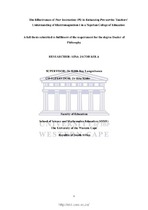| dc.description.abstract | This research study investigated the effectiveness of Peer Instruction (PI) in enhancing preservice teachers’ understanding of Electromagnetism I in a Nigerian college of education. PI
as a research-based pedagogy was invented for the teaching of introductory science courses
to large classes. Lectures in PI is made of short presentations on the main points, each
followed by short conceptual questions known as ConcepTest, posed in a multiple-choice
format, on the subject under discussion. Electromagnetism is a branch of Physics where
students perform poorly at Colleges of Education in Nigeria. Electromagnetism I covers
electrostatics, magnetostatics, current electricity, electrolysis, and capacitance. Each of these
themes has different topics under it. Most students studying Electromagnetism I, cannot
relate or connect what they learned in the classroom to real-world situations because they
often learn by memorization (rote learning). | en_US |

